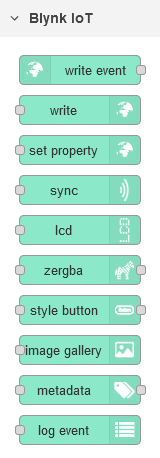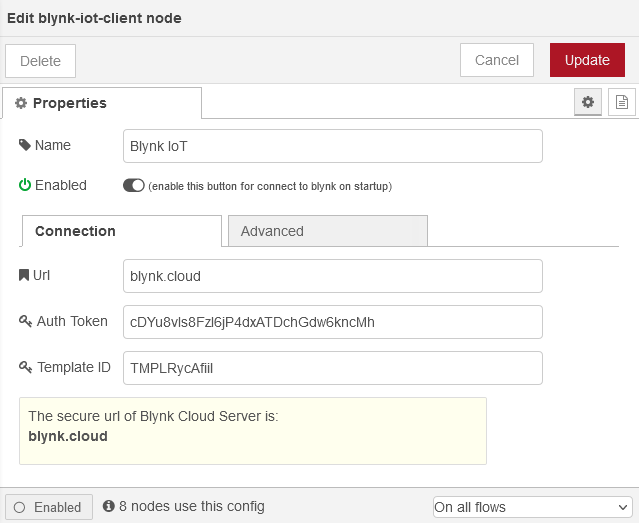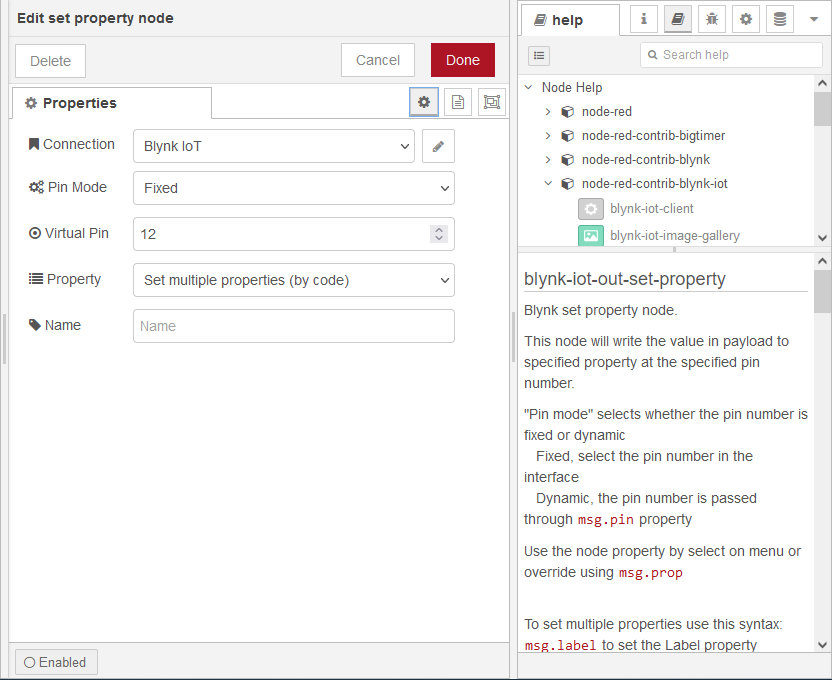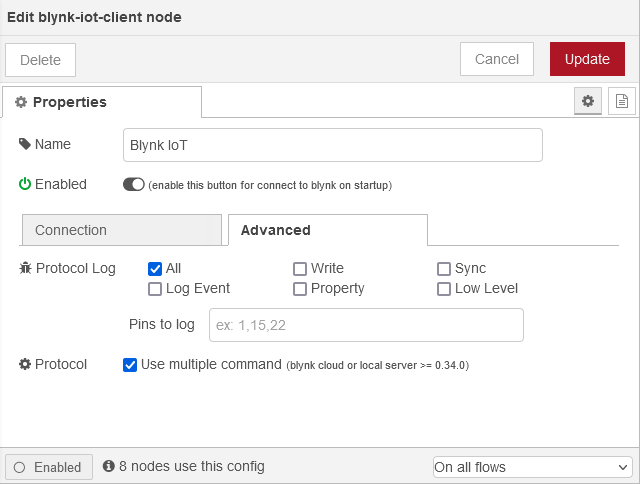node-red-contrib-blynk-iot
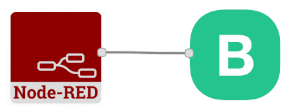
NEW Blynk IoT Platform library implementation for Node-RED
Node-RED <-> Blynk IoT Platform
This library supports secure TLS connection to new Blynk IoT Platform cloud server.
For Blynk cloud server, you can use blynk.cloud as the server url.
Local server is not yet supported.
Do not work on old Blynk 0.1 legacy platform
If you installed Node Red globally use this command to install
npm install --global node-red-contrib-blynk-iot
Supported events, commands and widgets
Events: write
Commands: write, sync (virtual/all), set property, metadata (get/set), log event
Widgets: LCD, zeRGBa, styled button, image gallery
Changelog
See the changelog for all the details of each releases
Node-RED palette
Blynk App Settings
Use Raspberry PI as hardware to access 256 virtual pins or Generic Board for 32.
How to use
Set your blynk server url, Auth Token and Template ID in configuration node
See help panel on every nodes
Debug
Use the verbose -v flag when starting Node-RED to get more information
or use node-red-log and enable log on Configuration Node as needed
Compatibility
This library is not retrocompatible and cannot replace node-red-contrib-blynk-ws.
The new Blynk IoT platform does not allow migration from the old Blynk 0.1 (legacy), so neither does this library.
Blynk is a unique IoT platform for connecting any hardware to the cloud, designing apps to control them, and managing your deployed products at scale.
-
With Blynk Library you can connect over 400 hardware models (including ESP8266, ESP32, NodeMCU, all Arduinos, Raspberry Pi, Particle, Texas Instruments, etc.)to the Blynk Cloud. Full list of supported hardware can be found here.
-
With Blynk apps for iOS and Android apps you can easily drag-n-drop graphic interfaces for any DIY or commercial project. It's a pure WYSIWG experience: no coding on iOS or Android required.
-
Hardware can connect to Blynk Cloud (open-source server) over the Internet using hardware connectivity available on your board (like ESP32), or with the use of various shields (Ethernet, WiFi, GSM, LTE, etc). Blynk Cloud is available for every user of Blynk for free. Direct connection over Bluetooth is also possible.
Downloads
Blynk Arduino Library
Blynk Mobile App:
Google Play |
App Store
Quickstart: Arduino + Ethernet shield
- Download the Blynk app (App Store, Google Play)
- Get the Auth Token from the app
- Import this library to Arduino IDE. Guide here
- In Arduino IDE, select File -> Examples -> Blynk -> Boards_Ethernet -> Arduino_Ethernet
- Update Auth Token in the sketch and upload it to Arduino
- Connect your Arduino with Ethernet shield to the internet
When you are connected - check the included examples on how to use different types of connections (transports) and explore Blynk features. You can combine any example for your hardware + transport + features.
Supported boards, Ethernet, WiFi, Bluetooth, GSM, Serial, USB...
Full list of supported hardware is here.
Check out our Examples Browser: http://examples.blynk.cc
Documentation and other helpful links
Full Blynk Documentation - a complete guide on Blynk features
Community (Forum) - join a 500,000 Blynk community to ask questions and share ideas
Help Center - helpful articles on various Blynk aspects
Code Examples Browser - browse examples to explore Blynk possibilities
Official Website
Social Media:
Facebook | Twitter | Youtube | Instagram | LinkedIn
Blynk libraries for other platforms
Libraries by community
- Python, MicroPython
- Particle
- Lua, OpenWrt, NodeMCU
- OpenWrt packages
- MBED
- Node-RED for Blynk IoT This library! and for old Blynk
Attributions
The node-red-contrib-blynk-iot was born as a fork of node-red-contrib-blynk-ws to support new Blynk IoT Platform
License
This project is released under The MIT License (MIT)






